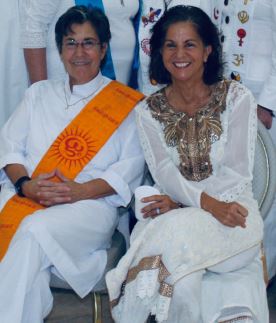FORT LAUDERDALE, Fla. – Many seminaries have roots in only one spiritual tradition. The Sacred Journey Interfaith Seminary has its roots in interfaith work as its own spiritual path. Reverend Lori Cardona and Reverend Dr. Grace Telesco founded the Sacred Journey Interfaith Seminary and now serve as its Co-Executive Directors. They began developing the curriculum in 2013 and ordained their first students in 2016. Cardona distinguishes “interfaith work as a spiritual path” from interfaith work as “a dialogue amongst people of different religions.” Cardona said that this “interfaith work as spiritual path” is to clergy as “spiritual but not religious” is to lay people.

[Reverend Dr. Grace Telesco and Reverend Lori Cardona. Dr. Telesco has the orange sash]
The seminary requires students to visit services of different religious and spiritual traditions. Cardona stressed that all paths lead to higher consciousness. She believes that ”it is essential in this time of history to not put God in a box.” Cardona continued, “Our students are not expected to pick one particular path, but to have a basic understanding of as many [paths] as possible so that they can expand their mind and their hearts around all cultures and faiths.” Cardona stressed that “we are all obligated to find our way on that sacred path.” She continued, “Sacred Service means that we can assist people as ministers without having a dogmatic approach.”
At present, the Sacred Journey lacks an on-line program. Students must attend in person, and many travel varying distances to do so. Cardona reported that a woman traveled monthly to South Florida to study with them. Another woman flew in from the Bahamas every month. Currently, one man flies in monthly from Colorado. The Sacred Journey is currently developing a scholarship fund.
In their first year, students examine faith practices, rites, and rituals. Each class session includes a ritual. The first year’s curriculum covers the “major world religions” such as Buddhism, Hinduism, and the Abrahamic faiths. That curriculum also studies minority religious and spiritual traditions. These minority religious and spiritual traditions include “indigenous practices, Goddess worship, Wicca, African spirituality, Sufism, Kabbalah, Gnosticism, [and] the Vedas” among others.
When studying religions of the world, the issue of cultural appropriation arises. The Sacred Journey does not ordain or certify people in any given tradition other than Interfaith. Cardona said, “We advise against them [the students] trying to do something that is outside an interfaith minister’s role. If they can officiate alongside a rabbi or a Hindu priest, then that is what they do. But they are never to take on the role of an ordained cleric that is beyond their field.” She continued, “Anyone who is already ordained in their field of expertise can continue as such. But it doesn’t work the other way around.”
The list of required religious traditions does not include some Pagan traditions such as Druidry and Heathenism. Cardona said “It’s almost impossible to teach every single religion or every single aspect of every religion that is available.” The seminary requires that “all the students have to choose one religion that is not covered in class and then they themselves present that religion to us. That requirement would give them the opportunity to explore further and investigate other aspects of religions.”
The second year of study stresses “how to be of Sacred Service.” Each student leads rituals and worship services. They will learn how to perform interfaith weddings, memorial services, and baby blessings. Students also learn how to lead guided meditations and how to pray in spiritually diverse groups.
More religiously, racially, and ethnically mixed marriages occur today than ever before. Cardona continued, “It’s not always easy to find someone who would officiate their marriage in a way that is inclusive and comfortable for both parties.” This maybe a critical niche for interfaith clergy. Graduates of The Sacred Journey are not automatically certified as chaplains. They would still need to obtain their chaplaincy certification elsewhere.
The seminary draws a diverse set of students. Two graduates identified as Pagan. One student was an ordained Hindu Swami. Another was a Baptist preacher. Cardona said that more women than men have enrolled in the seminary. She said the women came “from multiple ethnic and religious backgrounds.” Cardona felt that this gender imbalance resulted from the failure of mainstream religion to provide female clergy with leadership positions. She also said that the seminary has a mix of students with different sexual orientations.
Cardona identified the seminary’s major strength as the expansion of minds and consciousness. That strength involves expanding “what religion is, what culture is, what faith is, and what it means to be of service.”
The Wild Hunt is not responsible for links to external content.
To join a conversation on this post:
Visit our The Wild Hunt subreddit! Point your favorite browser to https://www.reddit.com/r/The_Wild_Hunt_News/, then click “JOIN”. Make sure to click the bell, too, to be notified of new articles posted to our subreddit.